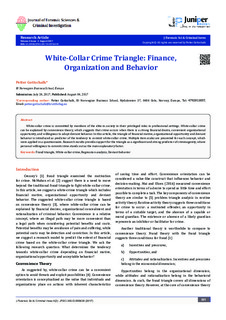| dc.contributor.author | Gottschalk, Petter | |
| dc.date.accessioned | 2017-09-29T07:54:12Z | |
| dc.date.available | 2017-09-29T07:54:12Z | |
| dc.date.created | 2017-08-09T16:39:39Z | |
| dc.date.issued | 2017 | |
| dc.identifier.citation | Journal of Forensic Sciences & Criminal Investigation. 2017, 4 (1), 1-7. | nb_NO |
| dc.identifier.issn | 2476-1311 | |
| dc.identifier.uri | http://hdl.handle.net/11250/2457398 | |
| dc.description.abstract | White-collar crime is committed by members of the elite in society in their privileged roles in professional settings. White-collar crime can be explained by convenience theory, which suggests that crime occurs when there is a strong financial desire, convenient organizational opportunity, and willingness to adopt deviant behavior. In this article, the triangle of financial motive, organizational opportunity and deviant
behavior is introduced as predictor of the tendency to commit white-collar crime. Multiple item scales are presented for each concept, which were applied in a questionnaire. Research results provide support for the triangle as a significant and strong predictor of criminogenity, where personal willingness to commit crime stands out as the main explanatory factor. | nb_NO |
| dc.language.iso | eng | nb_NO |
| dc.publisher | Juniper publishers | nb_NO |
| dc.title | White-Collar Crime Triangle: Finance, Organization and Behavior | nb_NO |
| dc.type | Journal article | nb_NO |
| dc.description.version | publishedVersion | nb_NO |
| dc.source.pagenumber | 1-7 | nb_NO |
| dc.source.volume | 4 | nb_NO |
| dc.source.journal | Journal of Forensic Sciences & Criminal Investigation | nb_NO |
| dc.source.issue | 1 | nb_NO |
| dc.identifier.cristin | 1485253 | |
| dc.description.localcode | forlagetsversjon | nb_NO |
| cristin.unitcode | 158,4,0,0 | |
| cristin.unitname | Institutt for ledelse og organisasjon | |
| cristin.ispublished | true | |
| cristin.fulltext | original | |
